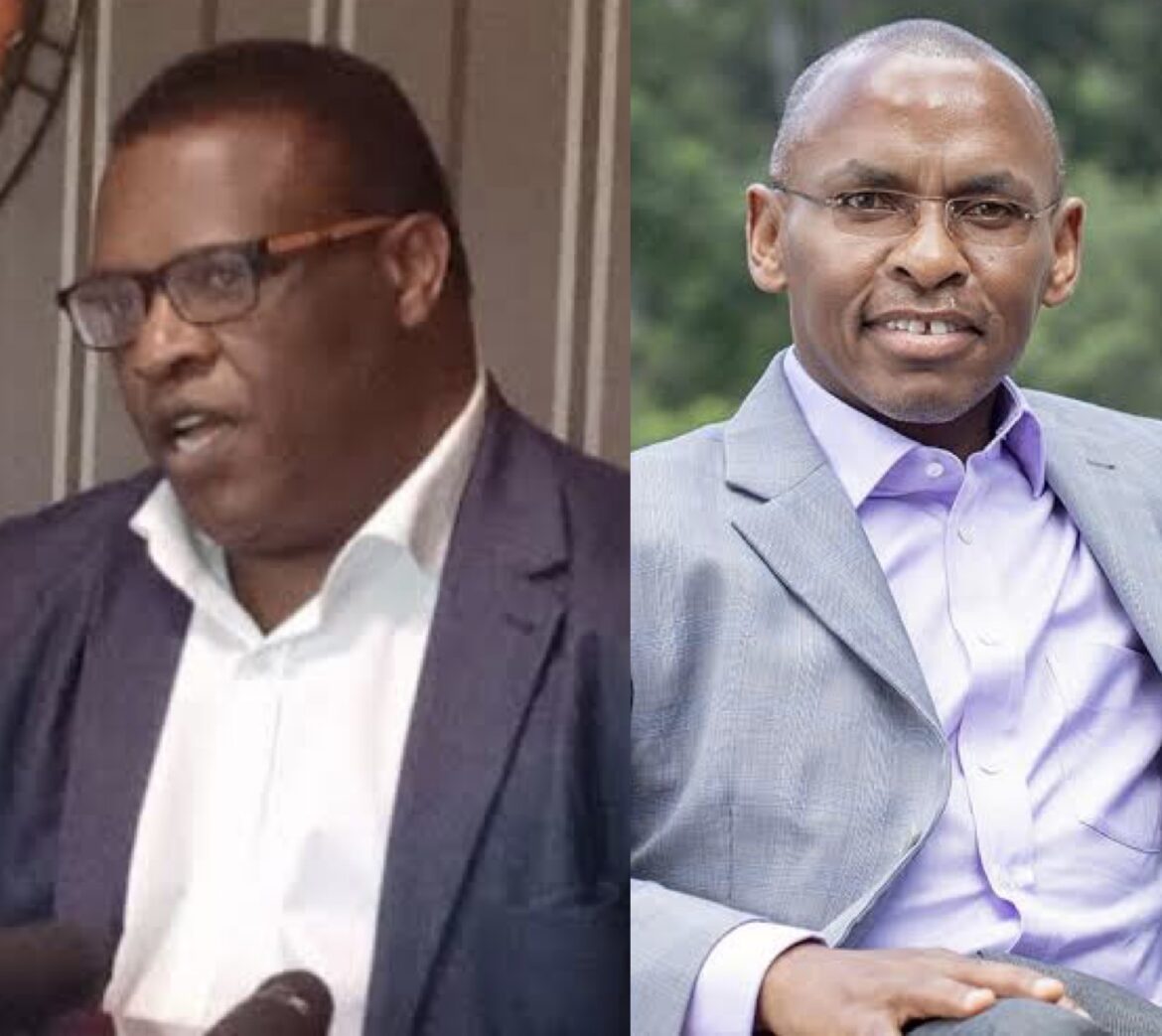Why the hell would Safaricom involve itself in the destruction and carving up of Sportpesa, yet the company (Sportpesa) was by 2017 Safaricom’s goose that laid the golden egg?
With annual revenues of up to 180 Billion, Sportpesa became the 2nd most visible and valuable Kenyan brand after Safaricom itself, before the Kenyatta family decided that they wanted to acquire the company by using Government agencies like Kenya Revenue Authority (KRA) and its Ministry of Interior and coordination of Government to pummel the company into submission.
This was done by hitting Sportpesa with a Kes. 95 Billion Tax bill on one hand, withdrawal of its betting license, as well as the deportation of its foreign Directors and employees on the other hand.
Remember, there was no intention of nationalizing the company so that its revenues could benefit the Kenyan people, but rather the Kenyatta family sought to shift the ownership and assets of Sportpesa to themselves through a series of both deft and clumsy moves, and by using the likes of longtime CEO, Ronald Kamwiko Karauri as a Trojan horse, to execute this nefarious plan.
For the avoidance of doubt, Sportpesa has always been a brand and trademark that was owned by PEVANS (EA) Ltd. We shall hereafter refer to this company a PEAL.
PEAL was initially incorporated as a shelf company by Peter Muchiri and Evans Njogu in 2011, and hence the play on their names (Peter & Evans) to create their company name PEVANS.
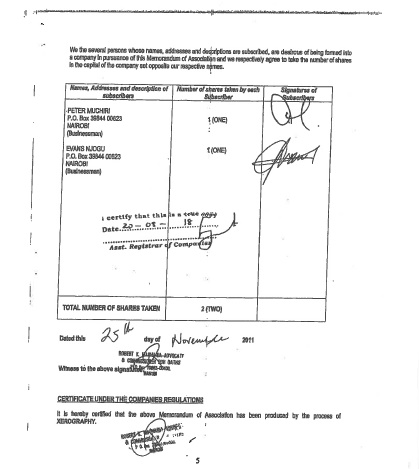
Original incorporations of PEVANS EA Ltd
The company was acquired by the late Hon. Dick Wathika (ex- Nairobi mayor) and his business partners Nikolov Gerrassim and Gene Grand (Bulgarians) and who in turn invited several other investors to help raise the capital required for this massive undertaking.
Some of the people who was convinced to come on board were Billionaire Paul Wanderi Ndungu who had made his fortune as Safaricom reseller and agent, and Ronald Kamwiko Karauri, a nondescript Airline pilot who had served as the Secretary General of the Kenya Airline Pilots Associations (KALPA).
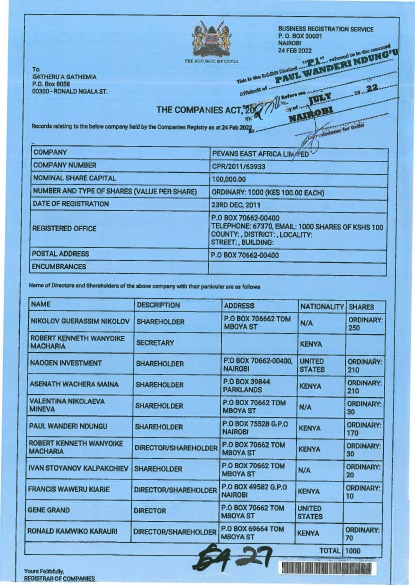
Form CR12 from Reg of companies on PEAL status
These two gentlemen each had shareholding of 17% and 6% respectively in PEAL and the majority shareholders nominated Ronald Karauri as the CEO, to run the day-to-day affairs of the Sportpesa operation.
The 3 majority shareholders (Wathika, Nikolov and Grand) each owned 25% and 21% of the shares in PEAL, with the rest of the shareholders being in the minority.
Following the untimely death of Hon. Dick Wathika on 15th December 2015, his shares were automatically acquired by his wife, Asenath Wacera Maina.
THE HEIST
In 2019, the Government withdrew the licenses issued to Sportpesa and several of the other top foreign owned companies in Kenya and deported their foreign directors. The reasons given for this unprecedented and sweeping move were both presumptuous and hypocritical.
For example, President Uhuru Kenyatta piously and sanctimoniously said that betting was destroying the lives of many young men who were using all their resources in gaming, which led to over-borrowing on mobile phone apps.
Ironically, the Kenyatta family owns the biggest money-lending app (Fuliza) which is owned and operated jointly by their bank NCBA and telco Safaricom.
In the intervening period, and quietly behind the scenes, the Kenyatta family deftly took a company by the name Milestones Games Ltd (MGL) and altered its shareholding where they would by proxy own a majority shares in the company through various other shell companies and individuals
Initially, the shareholding of MILESTONE GAMES LTD was;
| Name of Shareholder | No. of Shares held |
| Nob Five Limited | 9950 |
| Wilson Ngatia Karungaru | 50 |
NOB FIVE Ltd was then owned by the following;
| Name of Shareholder | No. of Shares held |
| John Munene Nderitu | 250 |
| Jackline Nyambura Kungu | 500 |
| Joseph Muendo Mutua | 250 |
However, this ownership of MILESTONE GAMES LTD changed in 2020 at the height of Sportpesa problems, and silently it was bought by new owners through a revised shareholding of NOB FIVE Ltd.
The new owners of NOB FIVE Ltd became;
| Name of Shareholder | No. of Shares held |
| Selenium Limited | 9600 |
| Jackline Nyambura Kungu | 400 |
However, it is the ownership of SELENIUM Ltd that is of most interest.
| Name of Shareholder | No. of Shares held |
| Francis Waweru Kiarie | 300 |
| Ronald Kamwiko Karauri | 400 |
Both of the new shareholders of MILESTONE GAMES LTD (through Selenium Ltd >Nob Five Ltd) are to-date still shareholders/Directors of Pevans EA Ltd. The most well-known is Ronald Karauri, the newest MP for Kasarani constituency in Nairobi County and the longtime CEO of Sportpesa.
The late Francis Waweru had been an earlier Chairman of Sportpesa.
In the background of this new shareholding structure, the Kenyatta’s hold shares by proxy, where both Ronald and Francis have signed blank share transfer certificates for shares in MILESTONE GAMES LTD in the interests of the Kenyatta’s, who can automatically transfer the shares to themselves whenever they so wish.
In the meantime, they are happy to pull strings quietly from behind the scenes until the ugliness of the hostile takeover is sanitized by the courts and other Government agencies.
The next step in the heist was to move the Sportpesa brand and other assets from Pevans EA Ltd to Milestone Games Ltd (MGL).
Brazenly, Ronald Karauri, while still holding onto the position of CEO/Director/ Shareholder of Pevans EA Ltd, purportedly transferred the registered Trademarks of Sportpesa from Pevans EA Ltd and sold it to another UK-based entity by the name Sportpesa Global Holdings Ltd (SGHL), which was the holding company for betting activities in Tanzania, South Africa and Russia, but had absolutely nothing to do with Kenya.
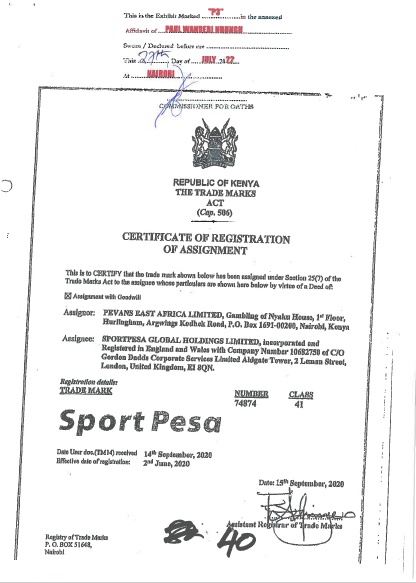
Certificate purporting to assign Sportpesa Trademarks to SGHL
Karauri “sold” these registered Sportpesa Trademarks to this other company (SGHL) without the knowledge of the other Pevans EA Ltd shareholders and Directors.
Karauri and Pevans EA Ltd company secretary Robert Macharia then compromised the Registrar of Trademarks to accept the transfer of these Trademarks.
Understand this, the Trademarks relating to Sportpesa had been built painstakingly over 5 years with Billions of shillings in advertising and brand exposure, like the sponsorships of top local teams, National teams, Hull City and Everton FC.
How did this poser (Karauri) sell these Trademarks for a mere £100,000, which was non-cash, and then somehow convince the Registrar of Trademarks that the 2nd biggest brand (after Safaricom) had been transferred this casually?
So brazen was the outright compromise of the Registrar of Trademarks that the application to transfer the Trademarks from Pevans EA Ltd to SGHL were lodged by the lawyer Robert Macharia on 14th September 2020 and the certificate of transfer was issued on 15th September 2020, despite the Trademarks Act asking for such transfer to be advertised over a period of 6 months.
Karauri and Macharia, then took these registrations to both Betting Control & Licensing Board (BCLB) and to Safaricom Ltd.
Even MGL had the audacity to write a preemptive letter to Safaricom, telling them of the imminent transfer of Paybills from PEAL to themselves, in one of the most inappropriate and unprofessional letters, yet.
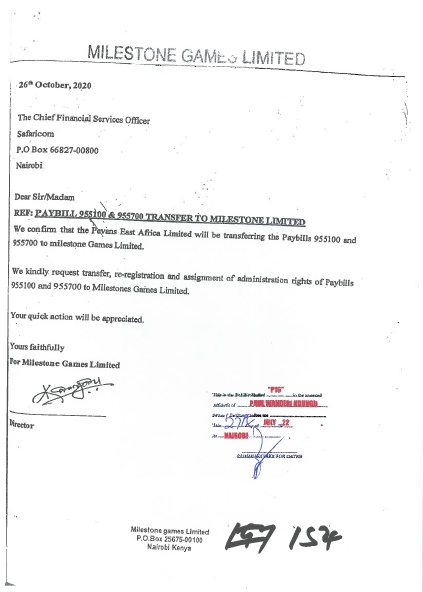
MGL letter to Safaricom which turned the telco into accessories in the criminal SportPesa Heist
BCLB would somehow alter an earlier decision not to allow MGL to operate as Sportpesa, and in 2022, grant them such a license in a move that confounded both friend and foe alike, in its total disregard of the law and which underscored the level of impunity and lawlessness in the country.
SAFARICOM: WHY?
While it is generally accepted that the various Government agencies are irredeemably corrupt, why would Kenya’s top blue chip company –Safaricom Ltd – get roped into the biggest corporate heist of this decade?
For sure, everything done by the Kenyatta family through their proxies Karauri and Macharia would have had zero effect had Safaricom Ltd insisted on proper due diligence before transferring the short codes and Paybill numbers owned by Sportpesa (PEAL) to the new entity (Milestones Games Ltd –MGL) which already had its own short codes and paybill numbers and was initially licensed to operate as MILESTONE BET.
For instance, Safaricom knew all the Directors of PEAL, including Paul Wanderi Ndungu who had separately been their top agent for close to 2 decades.
Why wouldn’t the clandestine transfer of the trademarks/short codes/Paybill numbers raise serious questions within the organization?
The Communications Authority of Kenya (CAK) even wrote a letter to the Telcos asking substative questions on the ownership of these shortcodes as evidenced by this letter dated 3rd November 2020.
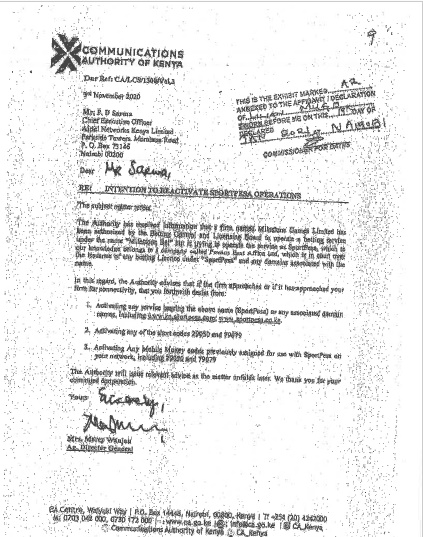
CAK acknowledgement of SportPesa Paybills
The due diligence needed to procure these short codes and paybill numbers is quite stringent and meant to be foolproof.
For the benefit of our foreign readers, we will breakdown what these paybill numbers and short codes are and the process of acquiring them.
Over and above the normal voice and messaging services, Safaricom is a Pan-African leader in the space for the fast growing digital money solutions. Millions of customers are therefore able to make payments off their mobile phones instantly and Safaricom collects these monies on behalf of their clients vide a paybill number or USSD Short codes.
In the case of Sportpesa they had the Paybill numbers 955100 and 955700 plus short codes 29050 & 79079. Over time and due to regular use, these numbers become embedded subliminally in the betting community and therefore a second nature. This led to great popularity of the Sportpesa brand.
The Paybill numbers and short codes became part and parcel of the complete identity of Sportpesa and there could therefore never be one without the other.
The Safaricom payments solution is called M-PESA and its CEO is currently Sitoyo Lopokoyit. Keep this name in mind as we progress as he earns pride of place in the sordid story.
In the run-up to the 2014 commencement of Sportpesa operations, Safaricom conducted an in-depth due diligence on PEAL and its license. BCLB had used Government agencies to vet the Directors of PEAL on their suitability to hold betting licenses.
Once Safaricom was satisfied with its own investigations, they entered into an agreement with PEAL for the Paybill numbers and short codes which is referred to as the M-PESA Paybill Gaming Terms & Conditions which have very strict rules.
For example, that Safaricom would activate the two Paybill numbers and short codes for PEAL and that they would remain available in perpetuity as long as PEAL held valid gaming (betting) licenses from the BCLB.
The terms and conditions signed between PEAL and Safaricom also expressly stated that the Paybill numbers and short codes were NEVER going to be transferrable until and unless there was a written approval and grant of authority by both PEAL and Safaricom.
Remember, these Paybill numbers and short codes appeared in the books of PEAL as current assets (in the balance sheet) because they held enormous amounts of money at any one time.
Safaricom has yet to account for close to Kes. 2.3 Billion shillings (approx. $23 million) that were proceeds of betting activities before Government intervention.
In fact, on 8th August 2019, Sportpesa CEO Ronald Kamwiko Karauri wrote to Safaricom and authorized the payment of Ksh. 500 million in order to offset some of the tax arrears claimed by the KRA at the height of the legal tug-of-war between PEAL and KRA.
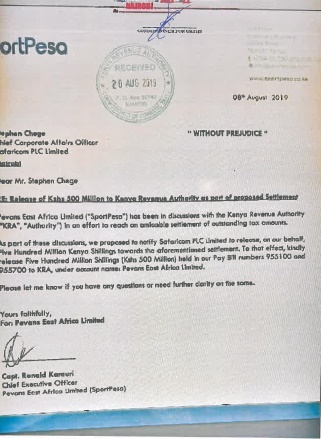
Ronald Karauri letter to Safaricom for release of 500M to KRA
This money was held in the Paybills at Safaricom, which helps to underscore how much of an asset these paybills really are.
The requirements for the disposal of such assets would require resolutions of both the shareholders and Directors of PEAL, filed formally with the registrar of companies and stamp duty duly paid for formal effect.
Is Safaricom run by incompetents that they would not verify this information before transferring the assets of a company (Paybills & Short codes) to another company?
Even after the BCLB refused to renew the betting licenses for PEAL for the year 2019/2020 due to the tax arrears issue, PEAL went to court in constitutional suit No. 252 of 2019 in which Safaricom were enjoined as interested parties.
However, it is good to note that BCLB had had every intention of renewing the betting (gaming) licence for PEAL as shown by this letter dated 10th March 2019 from BCLB CEO Liti Wambua.
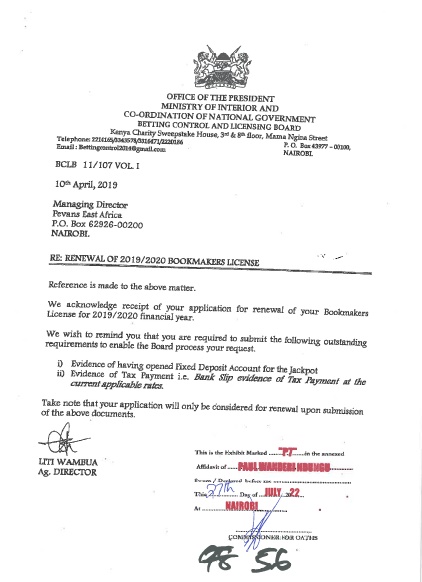
BCLB letter to PEAL on imminent renewal of licence 2019/2020
In a ruling on 30th August 2019, the High Court ruled against PEAL and stated that BCLB had acted within its powers to withdraw the betting license that had initially been granted to it.
PEAL immediately filed an appeal at the Court of Appeal vide civil appeal number 471 of 2019 and whose ruling was delivered on 21st March 2021 and wherein the court rejected PEAL arguments and upheld the decision of the High Court.
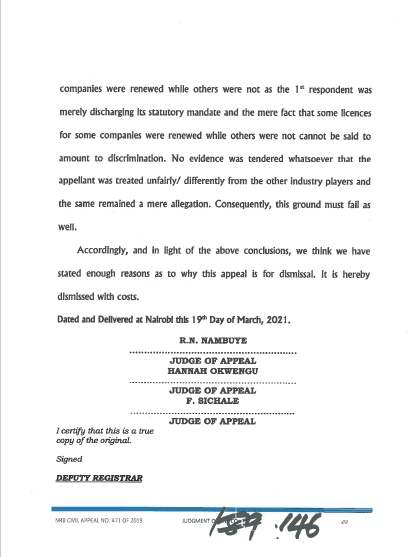
Court of Appeal ruling against PEAL in March 2021
In the intervening period, KRA issued preservation orders to all banks and to Safaricom Ltd with regard to PEAL (Sportpesa) bank accounts and the Paybill/short codes on 20th August 2020.
Preservation orders are issued by KRA to stop the operations of bank accounts and other platforms like M-PESA Paybills or short codes of PEAL, under the provisions of Sec 43 of the Tax procedures Act.
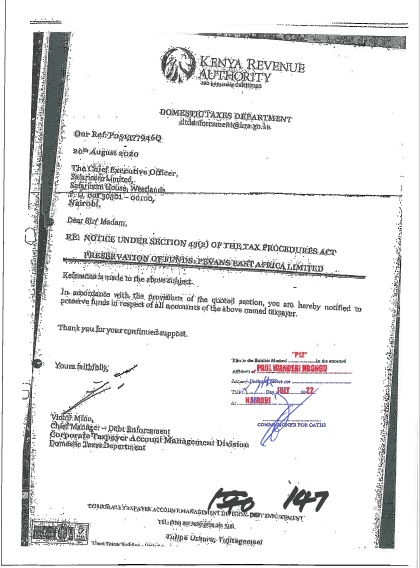
KRA preservation orders to Safaricom
On 16th September 2020, the KRA went to the High Court under case No. 025 of 2020 and obtained orders which extended the preservation orders for 21 days to 5thOctober 2020. On the a 5th October 2020, the court extended the preservation orders for an additional 60 days, until 5th December 2020.
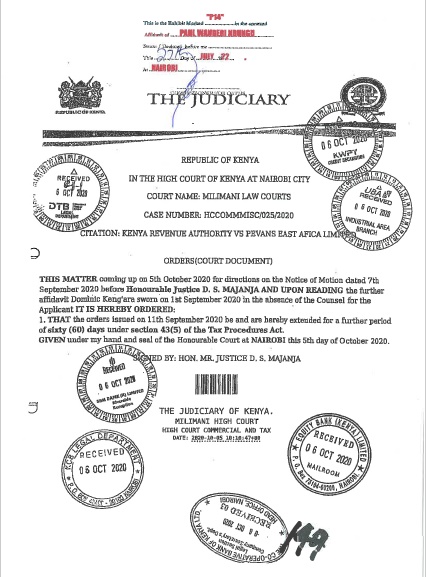
High court extends KRA preservation orders to December 2020
All these preservation orders were served on Safaricom Ltd promptly.
In the middle of all this legal acrobatics and preservation orders by KRA, Safaricom Ltd, which was familiar with the legal troubles facing PEAL, allowed for an illegal and fraudulent Novation agreement between PEAL and MGL where PEAL purportedly sold its properties (Trademarks, Paybill numbers and short codes) to MGL.
Shouldn’t Safaricom have flagged this transaction immediately based purely on the subsistence of court cases and action by KRA?
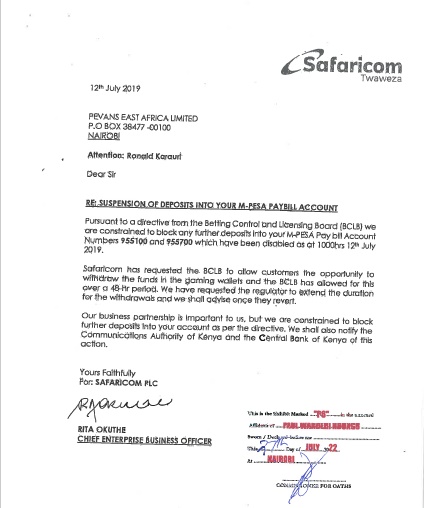
Safaricom letter to PEAL on stopping use of its Paybills
How did Safaricom transfer Paybills & short codes from PEAL to MGL during the subsistence of a preservation order on them specifically by the KRA and which were extended by the High Court?
Because there was blatant criminality on the part of Ronald Karauri and Francis Kiarie in the fraudulent transfer of the assets of PEAL to MGL, the DCI (Directorate of Criminal Investigations) sought orders and warrants of the court in order to carry out in-depth investigations into the complicity of both Karauri and Kiarie.
The duo sprinted to court and got preemptive orders against their investigation and possible arrest/arraignment on 17th December 2020.
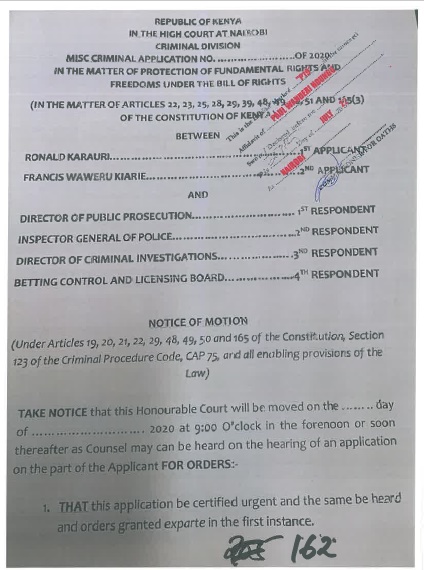
Pre-emptive bond application against imminent arrest for theft of PEAL property
Kenyans now understand why Karauri was desperate enough to use incredible amount of resources for a run at the Kasarani constituency Parliamentary seat, and outright purchase it.
He needed the extra cover against criminal prosecution that the National assembly offers its members, in a country that is as lawless as Kenya.
It has absolutely nothing to do with service to the people of Kasarani or their continued plight that needs honest and credible leadership.
Which is the tragedy of Kenyan politics.
PART-2: PAUL WANDERI NDUNGU vs SAFARICOM LTD: WILL HE BELL THE CAT?

